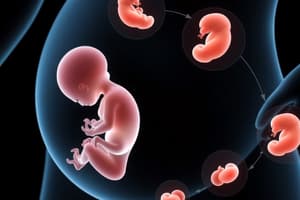Podcast
Questions and Answers
What proportion of the crown-rump length (CRL) does the head constitute at the beginning of the third month?
What proportion of the crown-rump length (CRL) does the head constitute at the beginning of the third month?
- Two thirds
- One quarter
- One half (correct)
- One third
By the end of the fifth month, what proportion of the crown-heel length (CHL) does the head occupy?
By the end of the fifth month, what proportion of the crown-heel length (CHL) does the head occupy?
- Three quarters
- One quarter
- One half
- One third (correct)
During which week does the fetal period begin?
During which week does the fetal period begin?
- 11th week
- 7th week
- 9th week (correct)
- 13th week
What is the expected maximum crown-rump length (CRL) for a full-term baby by 37-38 weeks?
What is the expected maximum crown-rump length (CRL) for a full-term baby by 37-38 weeks?
What happens to the growth rate of the head compared to the body as the fetus matures?
What happens to the growth rate of the head compared to the body as the fetus matures?
What is the primary function of the placenta?
What is the primary function of the placenta?
How is crown-heel length (CHL) defined?
How is crown-heel length (CHL) defined?
What is the expected developmental change in the head size from the third month to birth?
What is the expected developmental change in the head size from the third month to birth?
What is the range for crown-heel length (CHL) at 9 weeks gestation?
What is the range for crown-heel length (CHL) at 9 weeks gestation?
During which months is growth in length particularly striking for a fetus?
During which months is growth in length particularly striking for a fetus?
How is the length of pregnancy typically calculated?
How is the length of pregnancy typically calculated?
When is the increase in weight during pregnancy most noticeable?
When is the increase in weight during pregnancy most noticeable?
What accurately describes the chorion in a 9-week fetus?
What accurately describes the chorion in a 9-week fetus?
What structure is involved in the herniation of intestinal loops in a 9-week fetus?
What structure is involved in the herniation of intestinal loops in a 9-week fetus?
How is the age of a fetus typically expressed?
How is the age of a fetus typically expressed?
Which statement about fetal development is true at 9 weeks?
Which statement about fetal development is true at 9 weeks?
What components contribute to the fetal side of the placenta?
What components contribute to the fetal side of the placenta?
Which measurement is NOT typically used to determine fetal size?
Which measurement is NOT typically used to determine fetal size?
What is the average weight range for a newborn?
What is the average weight range for a newborn?
Which layer of the placenta is specifically formed from the uterine endometrium?
Which layer of the placenta is specifically formed from the uterine endometrium?
Which structure connects the fetus to the placenta?
Which structure connects the fetus to the placenta?
What significant development occurs in the fetus by the 3rd month regarding external genitalia?
What significant development occurs in the fetus by the 3rd month regarding external genitalia?
Which physical changes are observed in the fetus during the 3rd month of development?
Which physical changes are observed in the fetus during the 3rd month of development?
What is the percentage chance of survival for a fetus at the 7th month of gestation?
What is the percentage chance of survival for a fetus at the 7th month of gestation?
What characteristic distinguishes the skin of a fetus at 6 months of gestation?
What characteristic distinguishes the skin of a fetus at 6 months of gestation?
At which developmental stage can fetal movement be typically felt by the mother?
At which developmental stage can fetal movement be typically felt by the mother?
What term describes the fine hair covering the fetus around the 4th to 5th month?
What term describes the fine hair covering the fetus around the 4th to 5th month?
What notable feature is observed on a baby born at the 8th month of gestation?
What notable feature is observed on a baby born at the 8th month of gestation?
How can the month of pregnancy be determined if the last menstrual period is unknown?
How can the month of pregnancy be determined if the last menstrual period is unknown?
At what point in development is the skull circumference of the fetus larger than other body parts?
At what point in development is the skull circumference of the fetus larger than other body parts?
What is the typical weight range of a full-term baby at birth?
What is the typical weight range of a full-term baby at birth?
What happens to the intestines around the 6th week of fetal development?
What happens to the intestines around the 6th week of fetal development?
What is a characteristic feature of the fetal skin during the 3rd month?
What is a characteristic feature of the fetal skin during the 3rd month?
When is subcutaneous fat deposition notably visible in the growth of a fetus?
When is subcutaneous fat deposition notably visible in the growth of a fetus?
Which of the following is NOT a feature of the fetus during the 4th and 5th month?
Which of the following is NOT a feature of the fetus during the 4th and 5th month?
What is the correct duration of pregnancy calculated from the last normal menstrual period to determine full-term?
What is the correct duration of pregnancy calculated from the last normal menstrual period to determine full-term?
What is the fundamental role of the umbilical cord in fetal development?
What is the fundamental role of the umbilical cord in fetal development?
Flashcards are hidden until you start studying
Study Notes
Development of Fetus
- Fetal development begins at the 9th week and continues until birth, with significant maturation of tissues and organs.
- Crown-rump length (CRL) measures from the top of the head to the heel, reaching approximately 36 cm at full term.
- Crown-heel length (CHL), measuring from the head to the heel in a standing position, can reach up to 51 cm.
- During the 3rd month, primary ossification centers form, and external genitalia develop, allowing sex determination via ultrasound.
- By the end of the 3rd month, the fetus resembles a human, with notable facial features and thin skin showing blood vessels beneath.
Monthly Changes
- 3rd Month: Rapid growth; limbs reach proportionate lengths; external genitalia become distinguishable.
- 4th and 5th Months: Development of lanugo hair; fetal movements felt by the mother; significant length increase.
- 6th Month: The respiratory and central nervous systems are not fully developed; survival chances are low.
- 7th Month: Developmental milestones achieved; 90% chance of survival; sucking and swallowing mechanisms functional.
- 8th Month: Presence of vernix caseosa, a whitish protective substance on the skin, indicating gestational age.
- 9th Month: Skull is the largest part of the body; head circumference important for delivery, especially in breech presentations.
Time of Birth
- A full-term pregnancy is typically around 280 days or 40 weeks from the last normal menstrual period (LNMP).
- Accurate age calculation starts from fertilization, approximating 266 days or 38 weeks.
Placenta
- Fully developed placenta serves vital functions including nutrient transfer and waste disposal.
- Composed of fetal and maternal components; fetal side derived from trophoblast and extraembryonic mesoderm, maternal side from uterine endometrium.
- The placental barrier selectively permits substances to pass, protecting the fetus.
Umbilical Cord
- Connects the fetus to the placenta, facilitating nutrient and oxygen exchange via blood vessels.
- Critical for fetal development, providing necessary support throughout pregnancy.
Amniotic Fluid
- Surrounds the fetus, providing cushioning, temperature regulation, and facilitating movement, which is important for muscle and bone development.
Parturition (Birth)
- Involves three stages of labor: dilation, expulsion, and placental delivery.
- Proper fetal positioning during birth is crucial, with head circumference being a key measurement for safe delivery.
Weight and Size at Birth
- Average fetal weight at term ranges from 2,500 to 4,000 grams, with a typical length of about 51 cm.
- Normal fetal size assessment is essential for pregnancy management, especially in cases of potential complications. Low Birth Weight (LBW) is defined as weight below 2,500 grams.
Ultrasound and Fetal Monitoring
- Ultrasound is vital for determining gestational age and fetal development, measuring CRL, biparietal diameter, abdominal circumference, and femur length.
Studying That Suits You
Use AI to generate personalized quizzes and flashcards to suit your learning preferences.




